Q&A Interview with Erica Durance, Daniel Gillies & Larry Gilbert of SAVING HOPE
Maj Canton - April 19, 2012
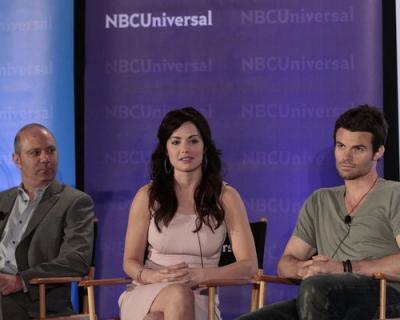
During the NBCUniversal Summer Press Day 2012, SAVING HOPE stars Erica Durance and Daniel Gillies were part of a panel with Larry Gilbert (Vice President, Current Programming, Entertainment One Television) to answer questions about their new series. Erica, Daniel and Larry discussed what makes SAVING HOPE unique, swapped stories about working together, revealed what it was like filming in a hospital, and dished about Daniel's role on VAMPIRE DIARIES.
After the panel was finished and the talent mingled with the press, TV Tango caught up with Erica for a little one-on-one time. What kind of scoop did we get?
- About Twitter: "I might get a Twitter account. I am putting my toes in the water very slowly. Do people really care about what shoes I’m wearing? Not sure I’d be very good at it, but I guess I should get a Twitter account since now I have something [her new series] to talk about. I’m in conversations with the network about it."
- About her loyal SMALLVILLE fans: "I really love my SMALLVILLE fans, they were so supportive for 10 years., I hope they watch SAVING HOPE."
- About how SMALLVILLE and BONES both have enthusiastic fan bases: "I am a secret BONES stalker -- in a good way :) -- I love the series. I love Emily, and downloaded 120 episodes of BONES from Netflix and watched them back to back. I watched while i was on the treadmill so I can say BONES helped me lose weight. While watching the episodes, I was rooting for them. I kept going, “Come on Bones (Emily) get together with Booth (David). He’s a good guy.” So happy they finally got together. I would love to do [a guest appearance on] the show. " And Hart Hanson already responded!
NBC presents the series premiere of SAVING HOPE on Thusday, June 7, 2012 at 10pm ET/PT. Enjoy the following transcript from the panel.
|
|
|
|
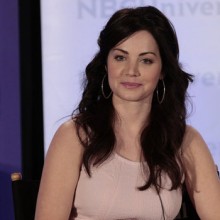 |
Question: Erica, what brought you back to TV, and how did you decide to do this show? Erica Durance: Well, I love TV, and I love a good script. I had been given a bunch of different choices, and I kept coming back to this one because of the heart that's in it and because of the love story. Yes, it has the medical side of it -- and I think that there's something in me that loves that side and all the angst and all the drama that can happen within that -- but really at the core of it, it's in the title. It's about holding on to hope or refining hope within yourself.
And as far as that character went, it was about what do you do when your world is falling apart. How do you hold onto the real and the rationale, the tangible, and how is she going to push through and bring him back to her. |
|
| And I think that it's universal. I think it's really relatable for people because if you want to basically demoralize somebody's spirit, you take away their hope. So she battles with how do I infuse the people that come in every day with hope in their own personal lives and in dealing with those medical current rational things when everything else is slipping away. | ||
|
|
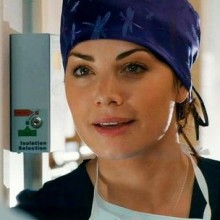 |
Question: Erica, was it important not to do another action or science fiction show? Erica Durance: You know what, I didn't even consider that. I just really fell in love with this, and that's where we are right now with it, and I think it has a little bit of something for everyone. |
|
|
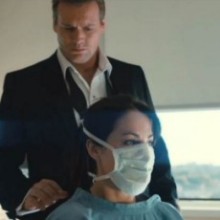 |
Question: Do you see any parallels between SAVING HOPE and AWAKE? Larry Gilbert: Not really. I think SAVING HOPE stands on its own as, like Erica said, a really solid medical drama, but it also has this added story that deals with science and reality and more. So I don't see the similarities because Charlie is still sort of interacting with our world and observing it, so I don't know if I see the parallels. I think the show stands on its own and is a really great drama.
Erica Durance: I think that that theme actually comes up and it kind of gets recycled in different formats, and you end up falling in love with the characters in each show, depending on how you relate to them. But I know myself, I'm constantly drawn back to stuff like that. For me, I can never get enough of that, and I'll tune into what's going on in their relationships and cheer for their love and their kind of questions and all that kind of stuff. So for me it's like, okay, that's fine, you're there, but we're here, too, and I think people will really engage in it and love it. |
|
|
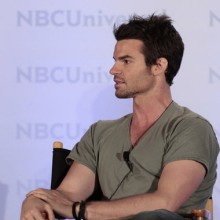 |
Question: Daniel, are you announcing that you've completely left VAMPIRE DIARIES? When were you offered this role? Daniel Gillies: Well, I wasn't offered this role. I auditioned for it. It was last year around April, and I have not entirely left the VAMPIRE DIARIES. Fortunately, we film at different times of the year. I'm deeply indebted to that show for what it's given me. Erica Durance: We'll steal him. Daniel Gillies: But this show takes precedence at this moment in time. However, I love Julie Plec and Kevin Williamson -- and I would do anything with them in a heartbeat -- but I can't really speak to any further adventures of Elijah on that show because I'll probably get fired.
|
|
|
Larry Gilbert: From which show? Daniel Gillies: Who knows? But I'm happy to be on this one and with actors like Erica. It's just a pleasure to come to work every day, I've got to tell you. I mean, it's an easy sort of thing to say up here. Erica Durance: I'll pay you later. Daniel Gillies: The Swiss bank account. Erica Durance: That's right. Daniel Gillies: No, it's an easy thing to sort of assume that one would come up here and say, but Michael Shanks, Julia Taylor-Ross, and Erica, it's a pleasure. And working with Morwyn Brebner and David Wellington, and Frank, they have created this whole architecture within which we feel like we're doing something incredibly original and touching and funny. It's really deeply human as well as mystical, and we all feel blessed to be part of it. |
||
|
|
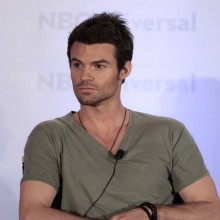 |
Question: What percentage of the show focuses on the relationships between people, the ghostly world, and the actual medical drama? Is there always going to be a big operation? Daniel Gillies: Well, yeah, those are the three, and I feel like we deal with those very admirably. It's always well balanced. We're five episodes deep now, and they always balance that so beautifully, and they're not mutually exclusive to one another either.
There's the harmony between what's happening in this sort of enchanted world, and thematically there are motifs that sort of marry into what's happening with the individuals and the surgeries of the week and the underlying texturals of the drama that's happening between us and our sort of past history and whatnot. I think they are doing a beautiful job of balancing that. I don't know how they are doing that to be honest. |
|
|
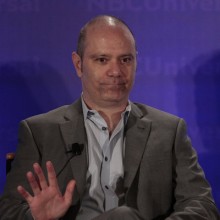 |
Question: In which city do you film? Are you filming in an actual hospital? Larry Gilbert: Toronto. The pilot was filmed in an actual hospital, and then given how difficult it was to be in a hospital -- you have to give deference to what's really going on there, and you don't want to be in the way and that sort of thing -- so they ended up actually setting up a whole studio for us that is a hospital. But in the pilot we were actually in a real one. |
|
|
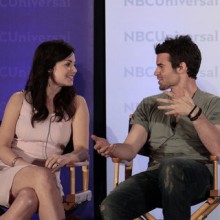 |
Question: What was it like filming in a real hospital? Did you visit the morgue? Erica Durance: We were in a specific wing of it. What was strange, and a little bit off-putting, is we would be in the middle of shooting a scene and then you would hear "Code Blue." You would know that that's somebody actually experiencing a very specific, painful tragedy right at that moment, and we would get caught in that kind of world, so it did have some of those elements to it and that feeling. Daniel Gillies: We weren't really permitted to go into places like the morgue, and we couldn't go to the other wards. I mean, I'm sure we could have. I'm sure we had access to some, but we were really there to work. |
|
|
It was also a hell of the way out of the city. What was it called, New Market? We were literally driven there and taken to set. There was no sort of opportunity to wander, so to speak. It just was sort of cinematically offered enough light to be able to do it, but what they have created now, the new stages are stunning.
Erica Durance: I'm constantly taking my own blood pressure because they have machines in there to see how I'm feeling. We're all becoming hypochondriacs. Erica Durance: I got a little emotional. Erica Durance: Which you'll see a lot in this season. Oh, here she goes again. Daniel Gillies: Get the tissues.
No, it's lovely to walk into an environment that you sort of have to act in and then you realize you're not going to have to do a hell of a lot of acting because they built a hospital. We felt so spoiled and so humbled because actors tend to think largely that they are the center of the universe, and then you realize everything else that goes on and we're just little pieces. |
||
|
|
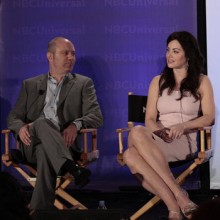 |
Question: Thinking about a second season, how important is it that Charlie is in a coma? Larry Gilbert: We're not going to say anything. You have to watch to find out.
But what Charlie and Erica's characters go through is important. It's that desperation of two people so madly in love and whatever they will do to get back to each other. I think that's the journey, and then wherever the writer decides to take it. We hope everybody moves on for the ride. |
|
|
Erica Durance: One of the things I also love about it -- sometimes it's hard to put into words, which is ironic considering you guys are trying to write things -- but it's the idea that they have taken this overall theme of hope and positivity and believing in something better than yourself and that sort of thing. They have taken that overall theme and then they have used the situation with Charlie going into a coma to kind of push it there. It's establishing itself. Then each episode, what they do is they pick some of the things we as human beings do to hold on to hope to fight desperately for. Are we blind to the reality of what's going on? Because she needs so badly to believe in something, and you see that interwoven throughout the whole episode.
And then at the end, occasionally you have Michael's character that is kind of able to view all of this ongoing. This is what we do as human beings to have contact with people, and some of us do this, and some of us do that, and it's kind of like a very non-judgment thing, but it puts out those Questions. Daniel Gillies: And really, just as a stand-alone medical show, it's really as good as any I have seen. I mean, it's stunning. If it was just a medical show, it's got a lot of clout and this other sort of dimension to it. |
||
|
|
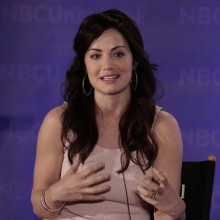 |
Question: Erica, what challenges or anxieties do you have being the lead of the show? Erica Durance: I constantly have anxiety about being the lead of the show. Larry Gilbert: She's fantastic. Erica Durance: I don't talk about it because it scares me. But I've always wanted to be part of something where I could work on a character in such a big manner, and you get offered that with all the trappings of being the lead of the show. |
|
|
I'm really excited. There's a lot of really good balance of male and female voices writing her, and I think that's really great because you get a full scope of the way women think which is really, really lovely.
The day-to-day schedule is crazy. We shoot seven-day episodes. We're shooting nine pages a day. We're shooting eight, nine scenes a day. I'll start off in the morning weeping and wailing over Charlie, and then I will be cutting into somebody's abdomen later.
I feel like one of the guys because I really get into all the prosthetics and the crazy side of it, and so you've got all the medical stuff and that kind of hype and fun going on. So it has been pretty insane, and it feels like a roller coaster, and I'm really grateful I get an opportunity to do it for a little while again. |
||
|
|
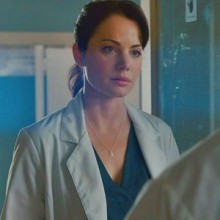 |
Question: Erica, what kind of medical research did you do and learning the jargon? Erica Durance: I'm always learning jargon, and I went to a hospital and I watched about six or seven surgeries -- the type of surgeries that my character does. She's a general surgeon, which means I'm learning everything from here to here. So that's what my character does.
That was kind of a real tangible thing I was able to do, and we have consultants and medical advisors that are actually there. They are gracious, and they come and give you advice and tell you things they would or wouldn't do, so that's been really, really good. |
|
| The medical jargon is a little bit silly. I remember I had to go -- I don't know how many takes into 16 hours -- and let me see if I can say this now, "pathognomonic syndrome of a carcinoma syndrome." I had to say about this kid, and he was such a great little guy and a much better actor than me. He kept laughing every time I messed up, and I was having little bit of breakdown because I was like I'm being undone by a nine-year-old. I can't do this. She's supposed to be doing CPR. We had to actually turn him over so I couldn't see his face because I was like, "I'm so nervous. He keeps laughing at me." | ||
|
|
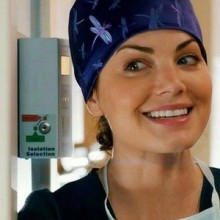 |
Question: Were you squeamish at all the first time you went to the hospital? Erica Durance: You know what, I wasn't. I don't know if I was compartmentalizing or that sort of thing. Especially within the hospital realm, there was that sense of awe and respect that I had for the folks that were signing off to let a schmo in there and watch the surgery. I just was trying to take in everything that the doctors were doing, but then on set I'm a bit of a silly monkey and that sort of thing. |
|
|
